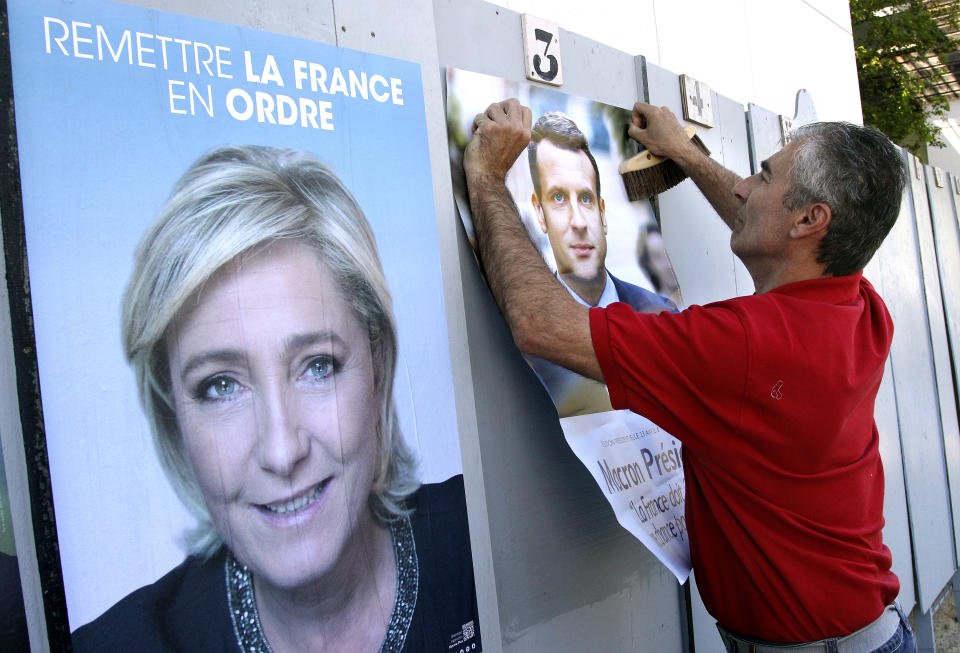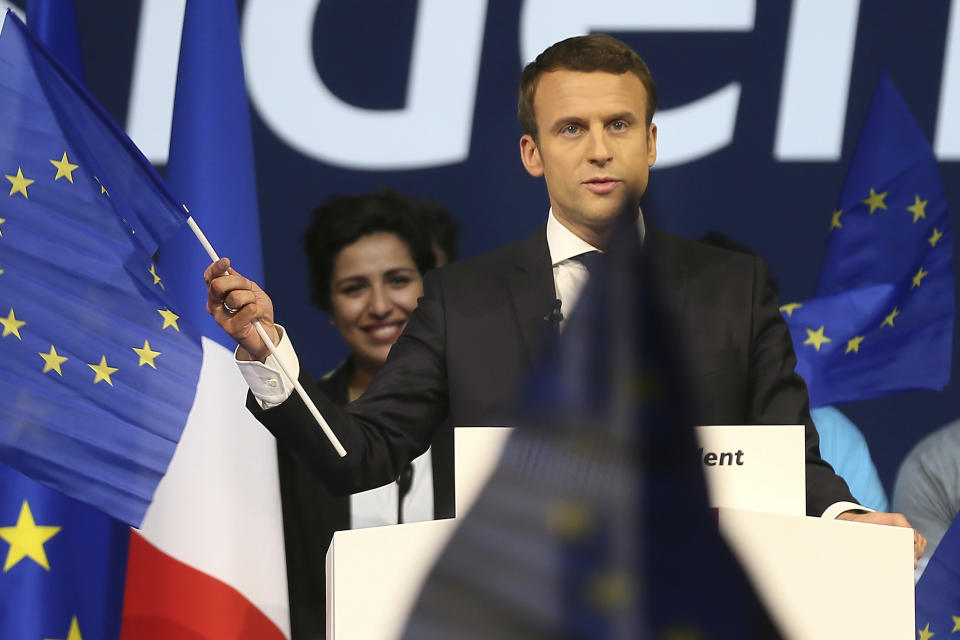What Sunday’s French presidential election means for markets
France will hold its presidential election on Sunday, a contest in which 11 candidates face off. In the wake of populist successes of Brexit and Trump, and relatively strong performance by Netherlands’ Geert Wilders, the French election will be closely watched as a bellwether for the European right and future of the European Union. Multiple candidates in France’s election have mentioned renegotiating or leaving the EU.
Since the French political system features many different political parties, a run-off is almost guaranteed since it’s almost impossible for a candidate to get a majority in the first round, or “Premier Tour.”
Of the 11 candidates, only four are seen as having a real shot of making the “Deuxième Tour” on May 7, the runoff election where the top-two finishers face off. Here’s a primer on the candidates, from right to left.
Marine Le Pen, Front National (National Front)

To many in France, Donald Trump was seen as an American Marine Le Pen, who took over her father Jean-Marie’s Front National party. Controversy surrounded the party for years (stemming mostly from anti-semitic and racist roots), but Le Pen has attempted to rehabilitate the party’s image. The primary aim of Le Pen’s populist party is the restoration of French identity, to be accomplished by closing borders, exiting the EU, returning to the franc, and implementing policies of economic protectionism – essentially a platform to “Make France Great Again!”
The potential economic impact of this French Trumpism is less clear than most of the other candidates, but analysts view it negatively. “[Global] markets’ immediate reaction is likely to be extremely negative,” IHS Markit principal economist Diego Iscaro wrote in a recent report. The impact would spread far beyond France, hurting asset prices in other eurozone countries and potentially weakening the euro vs. the dollar, Iscaro noted.
The longer term depends on how Le Pen would implement the National Front’s policies, which would be difficult as the French legislature, the pluralistic National Assembly, would oppose the wilder ones. (If Le Pen doesn’t have a majority of the National Assembly, she would have to pick a prime minister from a different party.) Support for the EU and euro is very high among the public, so a “Frexit” is unlikely even in a Le Pen victory. But if it were to happen, writes Iscaro, “the impact on the French and European economies would be difficult to overestimate.” Still, absent the extreme policies, analysts expect EU exports would benefit from the depressed euro, but purchasing power would be dented with increased inflation, and foreign investment would fall in the medium term.
François Fillon, Les Républicaines (The Republicans)

Formerly the favorite, François Fillon has been plagued by a corruption scandal and now the Republican candidate is polling just under 20%. A conservative who served as Nicolas Sarkozy’s prime minister from 2007 to 2012, Fillon’s Republicanism has similarity to American Republican positions: Advocating for reducing France’s large public sector, balancing the budget and free markets. However, while Fillon has personal positions of anti-abortion and anti-gay marriage—he has said he would not ban them as policy if president.
According to Iscaro, a Fillon victory would be viewed positively by markets, as his deregulation and pro-business policies of getting rid of the wealth tax (which tops out at 1.50% for people with €10 million) and cutting the corporate tax rate to 25% would benefit them. Furthermore, Fillon’s Republicans have perhaps the best shot at getting a majority in the National Assembly, making the policies more likely to be implemented than some of the longshots that other candidates’ platforms call for. “The Republicans have a far more extensive party apparatus and grassroots network capable of securing a majority, albeit slim,” writes Iscaro. “The main challenge for Fillon would be uniting a fundamentally divided party.”
Emmanuel Macron, En Marche! (On The Move!)

After recently leaving the right-wing of the Socialist party, France’s version of the Democrats, centrist En Marche!’s Emmanuel Macron comes into the election as the strongest favorite. Formerly a banker, Macron is an economic opposite to Le Pen, advocating for free trade and relaxed immigration policy. With a free-trade and budget-reducing agenda, Macron straddles the left and right similarly to Hillary Clinton’s business-friendly but socially progressive position, but without significant baggage. He’s currently leading the polls.
For analysts at IHS Markit, a Macron victory wouldn’t change the growth forecasts, especially because the party’s youth means it has never held any seats in the legislature, which will require him to build a government with more than his own cooks in the kitchen.
Jean-Luc Mélenchon, La France insoumise (Indomitable France)

Described either as a French Bernie Sanders or Hugo Chavez, the far left’s Jean-Luc Mélanchon has surged in recent polls. With a new political party (with a hard-to-translate name), Mélenchon supports many radical positions, including heavy taxation (90% for annual earners over €400,000—about US $430,000); a rejection of NATO, IMF, WTO, and World Bank; a new government structure with a weaker executive branch; and the implementation of stronger social programs and raising the minimum wage. And like his extreme-right counterpart, Le Pen, renegotiation and potentially leaving the EU is on the table.
This populist message is different from Le Pen’s and is one that, like that of Bernie Sanders, has energized the country’s youth. Mélenchon’s positions like exempting France from EU-wide deficits, a devaluation of the euro, and the restriction of free movement of capital have markets concerned, according to analysts at Capital Economics. And if the EU relationship couldn’t be renegotiated, a Frexit would pose “an existential threat to the common currency,” they said. Without France and Britain, the euro would be dominated by Germany.
However, as is the case with almost every candidate, the lack of a strong majority means it may be hard to implement policies.
Ethan Wolff-Mann is a writer at Yahoo Finance focusing on consumer issues, tech, and personal finance. Follow him on Twitter @ewolffmann. Got a tip? Send it to tips@yahoo-inc.com.
Read more:
Uber’s new tipping dilemma: low prices or smooth experience
Zuckerberg at Facebook conference: if you take one thing away—this is it
The cost of unifying North and South Korea
The trick to getting credit card fees waived? Just ask
Chase’s Sapphire Reserve is very worth it, even with its slashed bonus

 Yahoo Finance
Yahoo Finance 